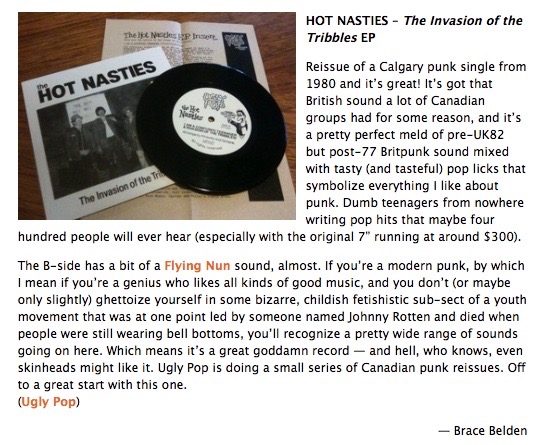Highly-scientific poll™: bombs away
.@realDonaldTrump's #Russiagate isn't going away. He will therefore soon…
— Warren Kinsella (@kinsellawarren) April 6, 2017
The Conservative Party is no longer the party of Harper
…and, for them, that spells disaster. Snippet from next week’s column below. And comments are open!
If the 2016-2017 Conservative leadership race is to be remembered for anything at all, it will be its willingness to replicate Donald Trump-style bigotry in Canada – and the narrow, mean-spirited bumper-sticker politics it has championed along the way.
Too many of their leadership candidates have forsaken what Stephen Harper did. Too many have forgotten that, by (a) coming together and (b) bringing new Canadians into the Conservative fold, the Conservatives finally won power.
Don’t miss it! Pierre Trudeau, in the words of those who knew him best
With Axworthy, Goldfarb and Marsden! I’m honoured to host. Tickets are going fast, here. It’ll be an amazing night!
ISIS, punk rock and the Hot Nasties
They’re all connected. Seriously.
So, there’s these two guys, profiled last week in the Washington Post:

Lucas Chapman, left, and Brace Belden, U.S. volunteers with the People’s Protection Units, or YPG, pose for a portrait next to a homemade armored vehicle in a rear base near Tal Samin, Syria. (Alice Martins/For The Washington Post)
See that guy on the right, Brace Belden? He and his buddy are anarchists, fighting ISIS. Hollywood wants to make a big movie about them. And Brace? Brace is a punk rocker.
Now, check this out, from five years ago in Maximum Rock’n’Roll, the premier punk rock mag:
See that, bottom right corner? No less than ISIS-fighting anarchist punk Bruce Belden calls the Hot Nasties Invasion of the Tribbles EP the record of the week, and “great,” “pretty perfect,” “tasty (and tasteful),” “a great goddamn record,” and “everything I like about punk.”
We were, Belden says, “dumb teenagers from nowhere writing pop hits” – which sounds about right. We were dumb teenagers (now we’re dumb adults).
Anyway. All of the Nasties hope he is keeping safe over there, and we look forward to his return. We will play Invasion of the Tribbles – the Palma Violets’ favourite – when we finally meet up.
Manifest brevity
You'd be forgiven for thinking the United States is not a serious country anymore. #USPolitics pic.twitter.com/cEYtHdEbaz
— Warren Kinsella (@kinsellawarren) April 5, 2017
Trump declares war on his allies
Get a load of this.
Visitors planning getaways to the U.S. might have to relinquish their cell phone contacts and passwords under new ‘extreme vetting’ procedures being developed by the Trump administration.
The tightening could even be applied to longtime allies who are part of the State Department’s Visa Waiver program, which provides expedited admissions without a visa to residents of a list of 38 nations including allies like Britain, Australia, and France.
Among the tougher new measures: Visitors would have to answer questions about their ideology, hand over social media passwords and financial records, and their contacts, the paper reported.
Homeland officials said tougher procedures would be applied not just to prospective refugees but to visitors and other would-be immigrants.
The Journal reported that the changes might even apply to the Visa Waiver Program, where nations agree to passport controls and other security measures in exchange for ease of movement.
I would expect and hope that the Canadian government will protest this latest Trumpist xenophobic insanity.
But I’m not holding my breath.
Allies in hate: Soldiers of Odin and the Jewish Defence League
The Soldiers of Odin is a rapidly-growing far-Right anti-refugee, anti-immigrant racist organization now found across Canada. Experts call them a terror group. More on them here and here.
The Jewish Defence League is a far-Right group that has itself been classified as extremist by the FBI for many years, and its parent organizations Kach and Kahane Chai are now officially terrorist organizations in Israel, Canada, the E.U. and the United States. More here and here. The JDL wasn’t always that way, as I write in Web of Hate, but it sure is now.
And now the JDL stands shoulder-to-shoulder with the Muslim and immigrant-hating Soldiers of Odin. An organization founded by an actual neo-Nazi.
Here’s just one picture of a Canadian JDL guy with a Soldiers of Odin guy, in Toronto. Here is a video of them causing a mini-riot at Toronto City Hall.
That the JDL and Soldiers of Odin are hanging out together may not be a big deal – it may even make sense. They both clearly hate Muslims and Muslim refugees. Hateful birds of a feather, etc.
But what is significant is that the JDL and Soldiers of Odin are now scooting back and forth across international borders, despite the clear linkages to terrorism, and despite their clear willingness to commit crimes of violence.
How is that possible? Why aren’t the authorities stopping them? What are the police doing about it?
All good questions. But what isn’t in question is that the Jewish Defence League and Soldiers of Odin are now united, in their shared hatred of refugees, immigrants and Muslims.
And that’s a problem for everyone.
The universe realigns: by-elections, (sort of) discussed and (kind of) analyzed
So:
- The Liberal vote was down in Markham, and the Tory vote was up.
- Liberals won big in Ottawa-Vanier, which is the safest Liberal seat in the galaxy. But it was the Dippers who came a (distant) second. Tories ran third.
- The Grit candidate in Stephane Dion’s riding – and we all adore her for defying the establishment and winning the nomination – absolutely crushed her challengers, with 60 per cent of the vote. The Tories got a third of that. Dippers came fourth.
- In Stephen Harper’s old riding, the CPC candidate – who I like because he looks like a Windsor New Democrat, not a Calgary Conservative – racked up similar numbers, taking 71 per cent of the vote, and the Grits didn’t even get a third of that.
- In the Southeast of Cowtown, where I used to live back when Jason Kenney was still a Ralph Goodale assistant, the CPC won nearly 80 per cent of the vote – and the Libs got less than 20 per cent. Ouch.
What’s it all mean?
Well, here’s my linkless, bulleted take:
- It means nothing. They were by-elections. Who cares.
- But, then again, maybe they mean something. Like, the universe is balancing out again – the Conservatives are retaking the West without a leader, and the Trudeau-led Liberals are still the folks to beat in the East.
- Also meaningful: more women in the House. That’s good.
- The Dippers weren’t a factor anywhere. Sure, they came second in Ottawa-Vanier, but not even a close second. They need to select Jagmeet Singh, fast, and get their shit together.
- In Markham, the Liberal drop, and the concurrent Tory rise, is perhaps something to keep an eye on. There was no change, but still: the CPC – even with a shitshow of a leadership race, and with no one really leading them – are edging back. Hmmm.
- In St. Laurent, the Liberal grassroots took back control – and they delivered for their anointed candidate, big time. Wonderful to see. Pay heed, PMO.
- Again: they were by-elections. Turnout sucked. Nothing changed. I’d be surprised if you are still awake.
Carry on as you were. The universe is aligned, and Kevin O’Leary is still Kevin O’Douchebag.
This week’s column: are you gay?
“Are you gay?”
It was 1983 or so, and my Carleton journalism professor, Roger Bird, had asked me if I was gay. I was surprised.
“Is that an issue?” I asked him.
“If you are writing an investigative series about gay people in politics, I think it is,” Bird said, and he was probably right, as he was about most things. “Are you?”
“No,” I said. I kind of laughed. “My parents thought I was, maybe.”
“Okay,” Bird said. “Go write.”
**
“Are you gay?”
It was 1979 or so. My Dad wasn’t angry or anything. He was just looking at me, asking if I was gay. We were in the kitchen, and the fridge was humming. Otherwise, silence.
I had written a number of pro-gay editorials in the school paper, my band had recorded a song that contained (funny) lyrics about gay sex, I went to gay bars occasionally with my punk pals, and most of my friends – at Calgary’s Bishop Carroll High School, which would later produce PC Premier Alison Redford, Wildrose leader Danielle Smith, and indie star Feist, among others – were gay. They were all in the closet, more or less, but my parents knew (or suspected) I hung out with a pretty gay crowd.
“Are you gay?” my Dad repeated.
“Seriously?” I said. I wasn’t, but I was pissed off. “What if I am? Does it matter?”
“It matters,” he said. I think he meant it matters in Seventies-era conservative Calgary, where homophobia was rampant, and gay-bashing not unheard of.
“No it doesn’t,” I said, then left, angry.
**
“Are you gay?”
NDP MP Svend Robinson had clearly been expecting the question, which is why he had one of his assistants present for our interview, tape recorder whirring away on the table between us. I was just a Carleton journalism student, and I was known to be pretty gay-friendly, but Robinson still looked terrified. He was gay, I knew he was gay, he knew I knew. But he still looked like he was ready to bolt from his own Parliament Hill office at any minute.
He gave a brilliant, passionate, thoughtful answer, but I don’t have my notes anymore. It was a great answer, one that sounded like it had been turned over in his head a million times, one that didn’t give anything away. But it didn’t deny anything either.
I wrote my story – Roger Bird later gave me an “A” and said some nice things about my writing – but I left Robinson’s sexual orientation unanswered.
It was his business. If he wanted to tell someone, that was up to him. On that day, for that assignment, it wasn’t going to be me.
**
“Are you gay?”
That’s the question k. d. lang asked Jason Kenney: “You’re gay aren’t you?” she tweeted at him.
She asked it, last week, because Kenney had proposed outing Alberta kids. Some media folks had asked him about school gay-straight alliances, and he said to them that parents should be notified when a kid joins one. Which, of course, has the effect of outing them.
Is the newly-selected Alberta PC leader gay? I don’t know. Many of us always assumed he was. None of us cared, either. It was his business. It was nobody else’s business.
Over the years, I have known many politicians who are in the closet, going back to that long-ago encounter with Svend Robinson. I wish they didn’t feel like they had to be. But, again, it’s their business. It’s personal.
Jason Kenney made the personal the political when he said what he said. It became important – as lang pithily observed – when Jason Kenney proposed one rule for gay kids, and an entirely different rule for guys like him. You know, like hypocrites do.
I’m an Albertan, like Jason Kenney and k. d. lang. Growing up, I sometimes talked to my high school friends about why they were in the closet. They said they feared the reaction of their families, or friends, or a future employer. Or they feared simply getting the shit beaten out of them. In other words, they had their reasons.
Jason Kenney may have his reasons, too. It’s his right. But Jason Kenney shouldn’t ever, ever use the law to take away the rights of kids, in Alberta or anywhere else.
When he tries to do that? Well, that’s when people will start asking Jason Kenney if he is gay, too.
Because a hypocrite is a hypocrite, gay or straight.
**
Are you gay?
If you are, it’s something to be proud about. If you are, I think it’s from God. If you are, it’s wonderful. If you are, it’s your business.
Not hypocrites like Jason Kenney.




